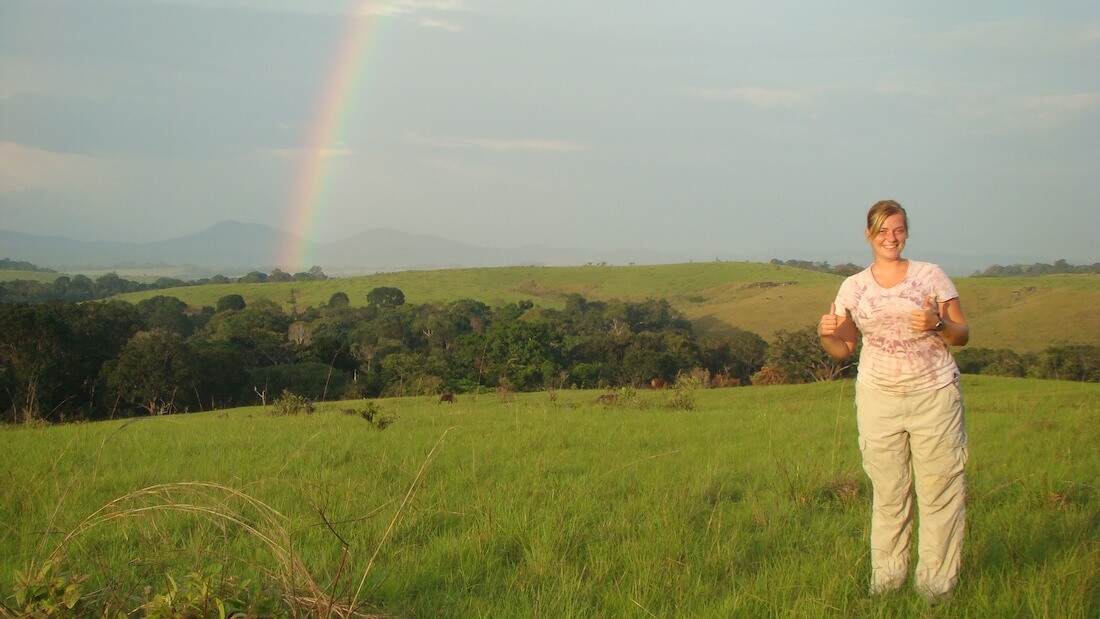Lorem ipsum dolor sit amet, consectetur adipiscing elit. Ut elit tellus, luctus nec ullamcorper mattis, pulvinar dapibus leo.


Stephanie Manka, Ph.D. is a wildlife biologist with 20 years of experience in mammal ecology and conservation, education, and outreach. Read her story to find out how she went from the daughter of a jeweler to a Ph.D. in wildlife biology.
Here you’ll find the best wildlife job boards and websites for careers in wildlife biology, ecology, zoology, and conservation that I’ve cultivated over my 20+ year career as well as others that my colleagues have recommended.
I’m a wildlife biologist who’s been working in this field since I graduated in 2003 and in all sorts of workplaces: the federal government, academia, zoos, museums, and alongside nonprofits. Given that I’ve had many temporary positions, which is the norm for this field, such as internships, postdocs, and graduate school, I’ve been on the job market on and off for a long time – really since I started.
Before you start perusing, I want to point out that it is SO important for you to really understand the jobs out there and if you are qualified before you apply.
What I’ve learned after receiving my Ph.D. in 2012 and being on the job market for awhile as a postdoc, is that the market is pretty saturated, which means that most jobs will be competitive.
I thought getting a Ph.D. automatically qualified me for lots of jobs because I was told my skills of problem-solving (through asking and answering research questions) would transfer, and to apply for jobs where I met 70% of the qualifications because this was just an employer’s “wish list”.
I think this may have been true years ago, but in my experience (and others – I have lots of Ph.D. friends telling me the same thing), employers choose candidates that meet and even exceed all of the qualifications they ask for.
Also, graduate school did not fully prepare me for these other skills I needed and this is something I often hear from other graduates. I never once said I wanted to go into academia; I said I always wanted to work in conservation. Again, I thought a Ph.D. would qualify me for lots of jobs in conservation, but after getting my Ph.D. and looking for and applying for jobs, I’ve been surprised by how few research-based jobs there are within conservation organizations (especially those located within the United States) and that most jobs within conservation are not science-based (e.g. marketing, communication, fundraising).
If I had known this in graduate school, I would have taken classes that could help me in these areas to make me more competitive (or even able to apply for a job!). For example, I was told I was strong candidate for one position I interviewed for, but I didn’t get it because I didn’t have fundraising experience.
Jobs in the federal government are particularly strict about qualifications and to apply for them you typically have a certain number of credits in certain courses to qualify even if you have a Ph.D. As an example, I do not qualify for some jobs simply because I never took a botany class. Again, if I had known this during graduate school, I would have taken this class even though I missed out on it during undergrad.
Therefore, what I really wished I had done before I went to graduate school, is to have a clear vision on where I wanted to go and what I wanted to be so I could make sure I received the skills I needed to get that job.
That’s why my biggest tip for you is to search for the jobs that you want right now. I created the Wildlife Job Tracker free workbook below to help you with this.
Use the best wildlife job boards and websites list below to find jobs that you want in conjunction with the Wildlife Job Tracker workbook to track the jobs and help you understand what job you want, wants. The Wildlife Job Tracker helps you dissect the jobs so that you can understand it and get the RIGHT skills, experience, and network that you need.
Now let’s get to the epic list of wildlife job boards and websites for careers in wildlife biology, ecology, zoology, and conservation! Note this list is US-centric, but I am adding to it to make it more worldwide.
Hands down, the Texas A&M Department of Wildlife and Fisheries Sciences Job Boardis the best resource for finding wildlife jobs, internships, volunteer opportunities, courses, graduate assistantships, and more! This has been the go-to job board for wildlife careers since I started in 2003. You’ll find the most postings here and all of the postings will be relevant – you won’t have to sort through job postings that have little to do with wildlife careers (e.g. exterminator).
Job postings do tend to be focused in the US though, so if you are from another country or looking for a job abroad, this may not be the best option for those positions.
The Conservation Job Board is newer, but also a fantastic resource making it #2 on my list. You’ll find lots of wildlife jobs, internships, volunteer opportunities, graduate assistantships, and more and won’t have to filter through non-relevant jobs.
The Conservation Careers Job Board is an excellent resource for opportunities and trainings of all kinds in Europe and abroad. You’ll find many more opportunities around the world than you will in the Texas A&M and Conservation Job Boards. The Conservation Careers Job Board not only has permanent jobs, but also tons of internships, volunteer positions, and even specialized trainings and courses. It’s great for finding all kinds of opportunities all over the globe. Note that some jobs are behind a paywall, but if it leads to a job or opportunity you love and that takes you in the right direction, it could well be worth it!
Ecolog is a huge listserve that you sign up for to receive emails about jobs and other opportunities. Note you will get A LOT of emails, so you might want to designate a separate folder in your email for this. But there are lots of great opportunities!
For government jobs at the state level (e.g. wildlife biologist at the North Carolina Wildlife Resources Commission), you will have to likely search at that state’s government jobs website. If you visit the state agency you are interested in, it will probably take you to a redirect page. Example here for North Carolina). I was also told you can find state jobs on governmentjobs.com, but I personally have not used this site before. Check out this link for more advice on getting into government job
Indeed has been a great resource in recent years! At first, Indeed mostly seemed to have only corporate or pesticide jobs, but now you can find lots of good wildlife jobs there as it aggregates job listings from countless sources, including those that might not appear on specialized boards. It’s best to set up alerts for words like “wildlife,” “conservation,” “environment,” and more and you’ll get jobs delivered to your inbox. Note, you will likely have to sort through at lot of duds, but it’s worth it as there are good opportunities that don’t always show up in the other job boards, especially if you are interested in consulting or working in the private sector.
Like Indeed, LinkedIn has become a great resource that you can set up alerts for to get jobs in your inbox daily. Again, you can find lots of good wildlife jobs there that might not appear on the typical wildlife boards. It’s also a great source to find jobs from large organizations like The Nature Conservancy and the Audubon Society without having to visit their individual websites. You’ll also want to set up alerts for to get jobs delivered to your inbox so you won’t miss anything. This is also a good place if you are interested in consulting jobs or working in the private sector.
The Society for Conservation Biology has been THE leader in conservation biology for decades and it’s job board is a great place to find jobs in conservation of course, especially for non-profit and international positions, which can be more difficult to find on other job boards. In fact, this used to be my favorite and go-to job board. It’s not as good as it used to be, but it’s still worth visiting regularly .
The Association of Zoos and Aquariums is the best job board for those who want to work in zoos and aquariums in the US. While it’s primarily focused on zookeeper roles, you’ll also find education and those rare and highly desired research positions. It’s definitely worth checking at least once a week!
The Nature Conservancy (TNC) is an organization you’ll definitely want to check out on a regular basis. TNC is a goldmine for aspiring wildlife professionals, offering wide range of roles with projects in 77 countries and territories. They always have positions open and there is a lot of variety within jobs. It’s also suppose to be a great place to work! For more on what it’s like to work for The Nature Conservancy, check out Fancy Scientist Podcast #109: Powering Conservation: Interview with The Nature Conservancy Scientist Dr. Liz Kalies.
Wildlife Conservation Society (WCS) is an organization you’ll definitely want to check out on a regular basis especially if you want to work internationally. WCS is based out of the Bronx Zoo in NYC, but has a presence worldwide in nearly 60 countries. Most jobs are in the Bronx or in developing countries. WCS prides itself in best-in-class science, working on the ground with local and indigenous people, inspiring and developing zoos, aquarium, and education programs, and through partnerships and policy influence. Nearly 4,000 people work for WCS.
The World Wildlife Fund (WWF) is an another great place for international opportunities. WWF is one of the world’s leading conservation organizations, working in over 100 countries. Their roles span a variety of fields, from species conservation and climate change initiatives to policy work and sustainable development. WWF offers opportunities to be a part of large-scale projects that tackle some of the biggest environmental challenges.
Conservation International (CI) is an organization that has been at the forefront of global conservation since 1987. CI has protected millions of acres of land and sea across more than 70 countries with offices in over two dozen countries and a network of thousands of partners. They prioritize fieldwork with cutting-edge innovations in science, policy, and finance. Again, if you’re looking for international opportunities to make a real impact, CI is a fantastic organization for this. Many of their jobs are also in Washington, DC, the location of their headquarters.
I personally have not used these wildlife job boards and websites, but they came recommended by others in this field.
Your next step is to look at the jobs that you’ve saved and start looking for common skills and/or requirements. This will then be your guide. You won’t be surprised by any qualifications.
While you are going through graduate school, make sure you get these skills. It may be awkward and you may have to take classes outside of your degree, but if you really want these jobs, you will ultimately have to demonstrate that you have these qualifications.
You may even surprise yourself! You may realize that the job you thought you wanted isn’t really what you want to do. Try this out and let me know in the comments below how this worked for you!
Want more advice? I’m wrote a book! Get “Getting a Job in Wildlife Biology: What It’s Like and What You Need to Know.”
Do you know you want to do *something* in wildlife, conservation, zoology, or ecology, but aren’t exactly sure what? Is this lack of certainty making you feel lost, confused, and stuck?
If you don’t know what you want to do, how can you prepare for it? With the intense competition in wildlife jobs nowadays, you need to be specifically prepared for the type of position you want – “wildlife biologist” is not specific enough.
Love this post? Share it with friends!
© All rights reserved 2024
I understand that inbox can be a lot and I respect your decision. If there’s anything you’d like to share or discuss with me in the future, don’t hesitate to get in touch.
We need the email you signed up with.
You have successfully joined our subscriber list.
I understand that inbox can be a lot and I respect your decision. If there’s anything you’d like to share or discuss with me in the future, don’t hesitate to get in touch.
We need the email you signed up with.
You have successfully joined our subscriber list.
Before we say our goodbye, I want to remind you that you have been an essential part of my journey. If there’s anything you’d like to share or discuss with me in the future, don’t hesitate to get in touch.
We need the email you signed up with.
You have successfully joined our subscriber list.

And get the 100+ Job Titles .PDF FREE!
Fill in the form below to be the FIRST notified once we open up our doors
Free Download
GIVE IT TO ME